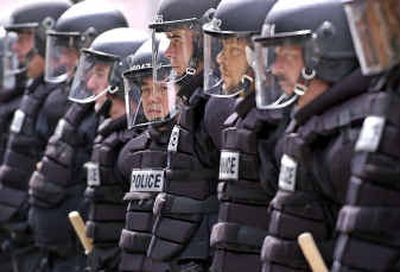High security unfurled for convention

DALLAS – Unprecedented security precautions – some visible, but many not – will be unfurled in Boston and New York this summer for the two major-party national political conventions, which U.S. officials fear could present enticing terrorism targets.
Bomb-sniffing dogs, pager-sized radiation detectors, high-tech cameras, increased marine patrols and battalions of uniformed and plainclothes officers will be deployed as the Democrats gather today through Thursday for their Boston convention, followed by the Republicans Aug. 30 to Sept. 2 in New York.
Government officials say they know of no specific threats to the conventions. But, they caution, a stream of credible intelligence indicates that al Qaeda intends to strike the United States prior to the November general election, emboldened by its perceived success in toppling Spain’s government with the Madrid train bombings earlier this year.
For more than a year, federal, state and local officials in both convention cities have mapped out intricate security plans, testing their preparedness with drills and disaster scenarios.
“Our goal is to deter any potential attack with multiple layers of security,” Homeland Security Secretary Tom Ridge said last week as he toured the 24-hour-a-day security command center in Boston.
Congress intends to give each city $50 million to help defray security costs, pegged at $50 million in Boston and $76 million in New York.
Manhole covers will be sealed and trash bins will be removed near the convention sites: Boston’s FleetCenter and New York’s Madison Square Garden. Sharpshooters will be stationed on rooftops, barricades will be erected and the ventilation systems of delegates’ hotels will be monitored.
Federal authorities also have dispatched to both cities “chempacks” containing thousands of doses of antidotes that could be used in the event of a chemical or biological attack.
With intelligence officials warning that al Qaeda may be particularly interested in attacking transit systems, bridges, tunnels or landmarks, law enforcement has beefed up security at those sites.
But that presents a major wrinkle for security planners: Both convention halls sit atop train terminals – North Station in Boston and Penn Station in New York.
To the consternation of Boston commuters, officials decided to close North Station as well as 40 miles of roads. In New York, Penn Station will stay open, but police will board trains before they arrive, sweeping them with bomb-sniffing dogs and devices to detect any radiation or chemicals. Police also will close swaths of Midtown Manhattan to traffic and pedestrians.
Other security precautions in Boston include discontinuation of deliveries of liquefied natural gas to a terminal that abuts Boston Harbor, intense Coast Guard waterway patrols, stepped-up police surveillance of downtown using remote-controlled video cameras and a ban on all but regularly scheduled commercial flights at Logan International Airport.
New York, hit by terrorists in 1993 and 2001, has had an elaborate security operation since Sept. 11, 2001.
Police have been reluctant to discuss their convention plans, but as many as 10,000 of the Police Department’s 39,000 officers will be involved. So will the department’s machine-gun-toting and body-armor-clad “Hercules” teams.
“We do not think another attack is inevitable. But we do think that they will try,” said New York Police Commissioner Ray Kelly. “Our job is to stop them.”
Beyond terrorism, police officials in New York – where protests are expected to be far larger and more antagonistic than in Boston – are trying to avoid a repeat of the rioting during the 1999 World Trade Organization meeting in Seattle.
Anti-war and anti-President Bush groups say hundreds of thousands of protesters will swarm to New York to demonstrate at the Republican convention.